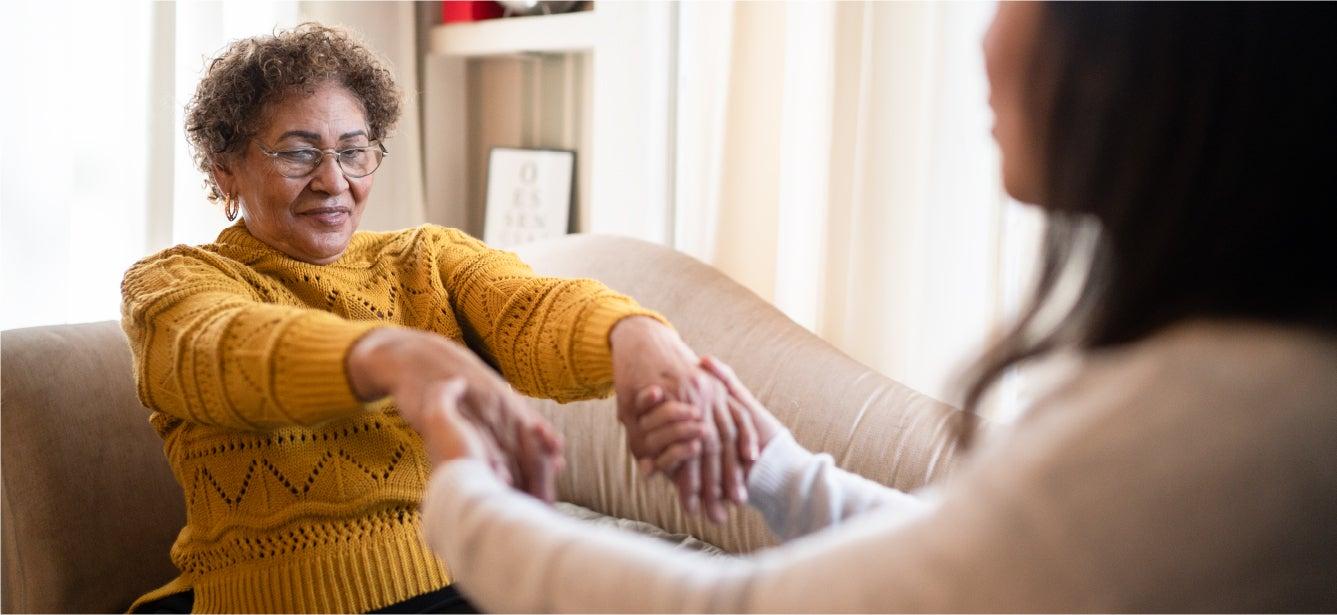The Mental Health Aspects of Parkinson's: How It's More Than a Movement Disease
5 min read

Related Topics
Many people think that Parkinson’s disease (PD) only affects movement, even some physicians hold this misconception. While movement-related (motor) symptoms of Parkinson’s—like tremor, slowness, and stiffness—are the most visible, there are many Parkinson’s symptoms that are unrelated to movement.
Some non-movement symptoms of Parkinson's include:
- Anxiety
- Depression
- Sleep disorders
- Cognitive symptoms
- Fatigue
These non-movement symptoms are common and have a great impact on everyday life. Depression and anxiety are the number one factors affecting overall health for people living with PD, according to the Parkinson’s Foundation's Parkinson’s Outcome Project, the largest-ever clinical study of Parkinson’s. This research underscores just how vital maintaining emotional health is to living well with Parkinson’s.
Parkinson's and depression: How are they related?
Depression is a mood disorder in which a person experiences overwhelming feelings of hopelessness and sadness to the point that these feelings begin to interfere with the ability to function. According to the Centers for Disease Control and Prevention (CDC), about 80% of older adults who are depressed have at least one chronic health condition.1
It is normal for everyone to feel sad from time to time, but depression is different because it is persistent, lasting for weeks or longer. Signs of depression include a loss of interest in usual activities, decreased attention to hygiene, and increased fatigue.
Depression is common in people living with Parkinson's; it’s estimated that at least half of people with PD will experience depression at some point.2 Depression can be the result of living with a chronic illness, but it’s important to understand that depression is part of PD itself.
Parkinson’s causes changes in areas of the brain that produce the chemicals responsible for regulating mood and motivation, so depression can be a PD symptom.
If you have signs of depression, don’t hesitate to ask for help. Treating depression can have a profound positive impact on quality of life and decrease disability. It is important to discuss any changes in mood with your healthcare team because they can provide you with effective treatment. Fortunately, there are effective treatments for depression.
Anxiety is not a reaction to a Parkinson's diagnosis, it's part of the disease itself
If you're an older adult managing a chronic illness like Parkinson’s disease, it can be stressful and it's understandable to feel worried or nervous at times. However, if those feelings become constant and begin to impact daily life, you may be experiencing anxiety. Signs of anxiety include excessive fear and worry, uncontrollable or unwanted thoughts, sudden waves of terror, nightmares and ritualistic behaviors.
Anxiety can be a Parkinson’s symptom, caused by changes in the brain. As many as 40 percent of people with Parkinson’s will experience some form of anxiety.3 It can begin before a person receives a diagnosis or develop much later.
If you think you may be experiencing anxiety, reach out to your health care team. You deserve support and treatment is available.
How to manage depression and anxiety when living with Parkinson's
Remember that you are not alone. There are seven (7) things you can do to live well even while experiencing mental health challenges.
Here are some tips for managing depression and anxiety while living with Parkinson’s:
- Talk to your doctor. Together, you can develop a treatment plan to help improve your mental health.
- Educate yourself about Parkinson’s, depression, and anxiety. Know the symptoms.
- Keep an open mind and be kind to yourself. Mental health challenges are not a personal failing or a sign of weakness, they are caused by a chemical imbalance in the brain.
- Keep a diary of your moods, medications, and PD symptoms to better understand what you’re feeling and what might trigger these feelings.
- Share how you’re feeling with your care partner or with someone you trust.
- Find a support group for people living with Parkinson’s to connect with your community and see if others have helpful tips for maintaining mental health.
- Call the Parkinson’s Foundation Helpline at 1-800-4PD-INFO (1-800-473-4636) to find additional resources and nearby wellness classes.
How can caregivers get support?
Parkinson’s disease affects the entire family, so it is understandable for caregivers to also experience mental health challenges as they navigate life with PD.
It's normal for caregivers to experience a range of emotions over the course of a loved one’s journey with Parkinson's. These emotions can include shock or denial at diagnosis, frustration or concern as the disease progresses, and satisfaction from supporting a loved one. Every family’s experience with PD is unique, but the emotional ups and downs are common.
Care partners often feel guilt or stress when trying to prioritize their needs but remember that you can't pour from an empty cup.
Here are five (5) tips on how to address your mental health needs as a caregiver for someone living with Parkinson's:
- Ask for caregiving support from friends and family. It’s okay — and healthy! — to be honest about your needs.
- Find a mental health counselor that you trust and make therapy part of your routine.
- Work with a social worker who can recommend resources that may help reduce your caregiving load.
- Find a support group for caregivers supporting someone who's living with PD.
- Think about a simple thing you can do for yourself today, like go for a walk or connect with other Parkinson’s care partners. Remember that being a caregiver is not the only role you have in life. It’s okay to take time for you.
Whether you're someone living with Parkinson's and a mental health concern or you're a caregiver supporting someone with PD and are managing your mental health issue, we're here for you. The Parkinson’s Foundation Helpline is here to answer your questions about life with Parkinson’s. You can call 1-800-4PD-INFO (1-800-473-4636) Monday through Friday from 9 a.m. to 7 p.m. EST. Helpline specialists provide callers with information about Parkinson’s, emotional support, and referrals to nearby professionals and resources.
Sources
1. Depression is Not a Normal Part of Growing Older, Centers for Disease Control and Prevention. Found on the internet at https://www.cdc.gov/aging/depression/index.html
2. Depression, Non-Movement Symptoms, Parkinson's Foundation. Found on the internet at https://www.parkinson.org/Understanding-Parkinsons/Symptoms/Non-Movement-Symptoms/Depression
3. Anxiety, Non-Movement Symptoms, Parkinson's Foundation. Found on the internet at https://www.parkinson.org/Understanding-Parkinsons/Symptoms/Non-Movement-Symptoms/Anxiety


